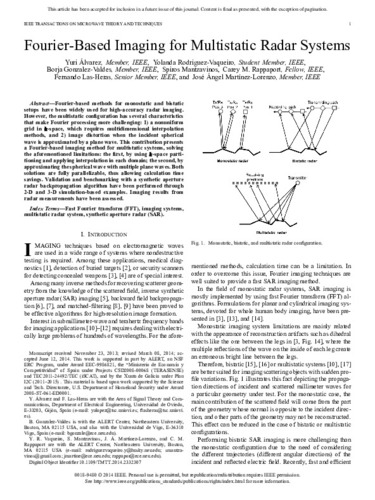Fourier-based imaging for multistatic radar systems
Fecha de publicación:
Editorial:
IEEE
Versión del editor:
Citación:
Descripción física:
Resumen:
Fourier-based methods for monostatic and bistatic setups have been widely used for high-accuracy radar imaging. However, the multistatic configuration has several characteristics that make Fourier processing more challenging: 1) a nonuniform grid in k-space, which requires multidimensional interpolation methods, and 2) image distortion when the incident spherical wave is approximated by a plane wave. This contribution presents a Fourier-based imaging method for multistatic systems, solving the aforementioned limitations: the first, by using k-space partitioning and applying interpolation in each domain; the second, by approximating the spherical wave with multiple plane waves. Both solutions are fully parallelizable, thus allowing calculation time savings. Validation and benchmarking with a synthetic aperture radar backpropagation algorithm have been performed through 2-D and 3-D simulation-based examples. Imaging results from radar measurements have been assessed
Fourier-based methods for monostatic and bistatic setups have been widely used for high-accuracy radar imaging. However, the multistatic configuration has several characteristics that make Fourier processing more challenging: 1) a nonuniform grid in k-space, which requires multidimensional interpolation methods, and 2) image distortion when the incident spherical wave is approximated by a plane wave. This contribution presents a Fourier-based imaging method for multistatic systems, solving the aforementioned limitations: the first, by using k-space partitioning and applying interpolation in each domain; the second, by approximating the spherical wave with multiple plane waves. Both solutions are fully parallelizable, thus allowing calculation time savings. Validation and benchmarking with a synthetic aperture radar backpropagation algorithm have been performed through 2-D and 3-D simulation-based examples. Imaging results from radar measurements have been assessed
Patrocinado por:
ALERT, an NSF ERC Program [EEC-9986821]; Ministerio de Economia y Competitividad of Spain [CSD2008-00068, TEC2011-24492/TEC]. Xunta de Galicia under Plan I2C; Science and Tech. Directorate, U.S. Department of Homeland Security [2008-ST-061-ED0001]
Colecciones
Ficheros en el ítem




